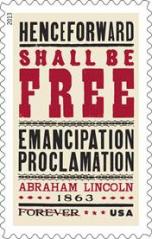On January 1, 1863, President Abraham Lincoln signed the Emancipation Proclamation, the document freeing those who were enslaved by persons in rebel states. A special postage stamp is marking the proclamation's 150th anniversary. There is no image – only words: "Henceforward Shall Be Free" with "Emancipation Proclamation 1863" written underneath. The letters spelling "free" are large and blood red. Below in smaller type is Abraham Lincoln's name. The word "forever" is in the bottom left corner indicating that this stamp can be used to mail a letter even as postal rates change. Surely there is also a double entendre in the use of the word.
Graphic designers Antonio Alcala (a good friend of mine) and Gail Anderson created the look of a Civil War broadside in producing the stamp. They turned to one of the oldest letterpress print shops in the U.S., Hatch Show Print in Nashville, Tennessee, for assistance. Early on the first day of the new year my husband and I stood in line with 200 people in front of the National Archives to await a special ceremony – to see the stamp unveiled for the first time, hear a reading of the Proclamation, and view the original document. (The document is rarely displayed because the paper is so thin that it can be easily damaged by light.) Those who stood in line were African American and white – the woman in front of us had ancestors who had fought on both sides of the Civil War. We huddled together on the sidewalk – not only because it was cold but also I think because we wanted to share the moment. We were part of something important.
Students of history and all those who have watched the new movie "Lincoln" know how heavily his responsibility weighed on the president. On that day, January 1, 1863, he told his secretary of state, William H. Seward, "I never, in my life, felt more certain that I was doing right, than I do in signing this paper." Although the Emancipation Proclamation did not free those in the North or in border states it sent a message that the war was being fought for freedom.
Still there were those who thought President Lincoln was too restrained. Harriet Tubman was one of them. She had wanted the president to declare that all enslaved people were free. Only after Abraham Lincoln's death did this antislavery activist come to learn that "he was our friend."

